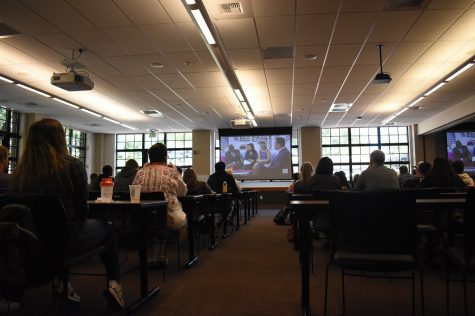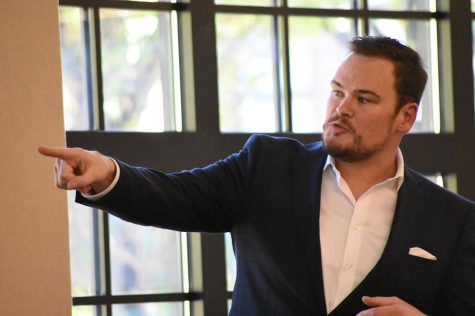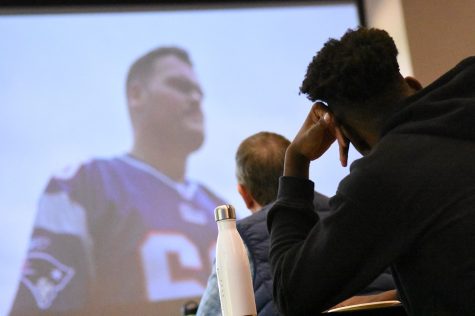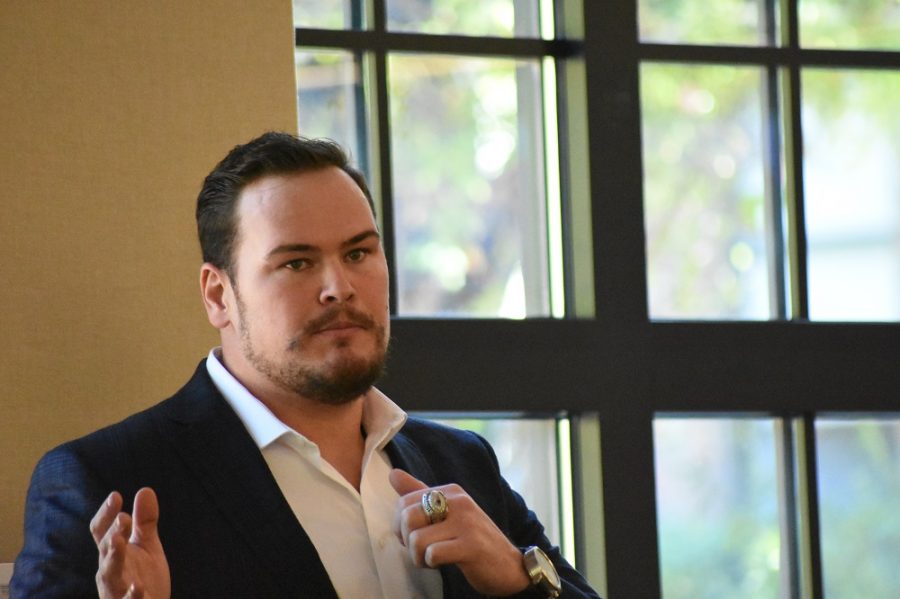For star football player Ryan O’Callaghan, growing up was hard. Raised in a conservative environment, strong beliefs were instilled in him early.
O’Callaghan kept a deep secret for 34 years. He felt trapped, but escape was never an option—until about two years ago when he decided it was time to break free.
On Wednesday, O’Callaghan drove to Chico State from his hometown, Redding to share his story with around 100 students and faculty members.

In 2017, O’Callaghan came out as the first openly gay NFL player. He played offensive tackle for the New England Patriots and the Kansas City Chiefs and retired in 2011.
In the NFL, he became addicted to painkillers. While he did suffer from shoulder and hand injuries, the painkillers were more than medicine for him—they helped mask his mental pain.
Growing up in Redding, O’Callaghan was always around sports. His dad was a sports fan but Ryan didn’t share his passion.
In school, he knew he was different
. He never crushed on girls like his friends did.

“I had zero draw to football,” O’Callaghan said. “I was friends with the drama kids and musicians.”
Though he was surrounded by sports, O’Callaghan never played one before high school.
“I decided to play football,” he said. “I thought it’d be easier to do that instead of answer questions of why I would not.”
Football strictly served as his cover-up, but junior year he realized his potential when, after attending a Berkeley summer camp, he was offered a full-ride scholarship from the head coach.
“Up to that point, I always avoided the spotlight,” O’Callaghan said. “I was perfectly fine just cruising through life. I had no long-term plans whatsoever.”
He received 24 full-ride offers from various colleges, but O’Callaghan chose Berkeley. He didn’t know where it would lead, only that he was going to keep playing.
“I found football as a great place to hide,” he said.
During his time at Berkeley, O’Callaghan maintained a tough-guy persona. He told teammates he had a girlfriend back home to suppress potential questions.
He did whatever he could to convince people he was straight. He started chewing tobacco, put on weight and tried to make himself as unattractive as possible.
Beginning his junior year, O’Callaghan was in contact with NFL scouts. He was drafted to the New England Patriots in the fifth round of the 2006 draft.

When O’Callaghan got to New England, he continued his charade, fictional girlfriend and all. O’Callaghan said he didn’t think he could make a woman believe he was straight, but he knew he could continue to use football as a mask. He said he never once considered dating a man, as he thought that he would be caught.
After three years with the Patriots and a Super Bowl loss, he was released from the team at the last cut. Scott Pioli, the general manager who originally drafted O’Callaghan, picked him up as soon as he was available.
O’Callaghan used this move to Kansas City to reinvigorate his career. Despite his mental health struggles, he found great success on the Chiefs.
A tear to his left groin, however, left O’Callaghan permanently impaired. With several previous injuries throughout college and on the Patriots, he knew this injury meant his career was over.
He knew deep down that more than his career was over: he planned to take his life after his career ended.
“Everyone handles being closeted differently, but for me, I built it up in my head just to be this mountain I could never climb and never get over,” O’Callaghan said.
He began taking daily doses of Oxycontin.
“When you hate yourself, you’ll do anything to not feel like yourself,” he said.
The Chiefs’ trainer, Dave Price, noticed something was off with O’Callaghan. Price recommended that O’Callaghan speak with team psychologist Dr. Susan Wilson. O’Callaghan began meeting with her and one night, he revealed his secret.
She was the first person to whom O’Callaghan ever said the words “I’m gay.” Dr. Wilson immediately hugged him and told him that he wasn’t the first football player to come out to her.
Dr. Wilson then brought up something that had never crossed O’Callaghan’s mind:
“If you’re just going to end things, why don’t you find out if you need to? Why don’t you go talk to these people that you’re so afraid of and find out if they’ll love you?” she asked.
That conversation was one O’Callaghan had dreaded his whole life. He had started pushing family away, thinking that it would make things easier when he ended things.
Despite that, he called his parents and told them they needed to talk.
When he talked to his parents, O’Callaghan’s mother was accepting, but his father took a while to come around.
“There was never any hate,” O’Callaghan said. “What I built up in my mind that I thought was going to happen couldn’t be further from the truth.”
O’Callaghan did not plan on living after football ended; he had spent lots of money. The only things he had focused on before coming out were playing football and wondering how to get out of it; he never considered a next step.
Self-improvement became his main focus for the first year after coming out. He learned to love himself, talked with a therapist and got off drugs. He moved back to Redding and started coming out to friends.
He waited five years to come out publicly.
The support he received from the public was immense. The catastrophe he feared from coming out never occurred.
“The friendships I kept after I came out ended up being stronger than ever before,” O’Callaghan said.
“I’ll never escape being a retiring NFL player,” O’Callaghan. “It’s something to be proud of even though I wasn’t passionate about it. It still took a hell of a lot of work to get there. I’m happy for what it’s provided me and what it led to today. I wouldn’t go back and change anything because who the hell knows where I’d be today.”
O’Callaghan started a charity called The Ryan O’Callaghan Foundation that supports LGBT youth and wrote a book called “My Life on the Line: How the NFL Damn Near Killed Me and Ended Up Saving My Life.” All profits from his book and speaking engagements go toward his charity.
While an active NFL player has never come out, O’Callaghan hopes to serve as a stepping stone for further advancements with athletes in the LGBTQ+ community.
His target audience is straight, white, middle-aged males who may not understand the LGBTQ+ experience. He hopes that by changing the worldview of this demographic, he can help create a more accepting environment in small town America.
O’Callaghan tried everything he could to change himself, effectively living a lie for the first 34 years of his life. Now, he is finally free.
Karina Cope can be reached at orionmanagingeditor@gmail.com or @KarinaICope on Twitter.





